Businesses operating or expanding into the EU are well aware of the General Data Protection Regulation (GDPR), a strict framework designed to protect user data and privacy. For marketers, this means adhering to rules about data collection, storage, and usage while maintaining the ability to analyze and optimize campaigns effectively.
In this guide, we review the 5 best GDPR-compliant analytics tools that enable businesses to harness data responsibly and drive results without compromising compliance.
What Does It Mean to Be GDPR Compliant?
To be GDPR-compliant in marketing analytics means adhering to strict data protection and privacy regulations when handling user data and using privacy-friendly analytics tools.
Key aspects include:
- User Consent: Obtaining explicit consent from users before collecting or processing their personal data, ensuring transparency about how the data will be used.
- Data Minimization: Collecting only the data necessary for specific marketing purposes and avoiding excessive or irrelevant data collection.
- Secure Data Handling: Implementing robust security measures to protect user data from breaches or unauthorized access.
- Right to Access and Erasure: Allowing users to access their data upon request and providing options for data deletion if users withdraw consent.
- Cross-Border Data Transfers: Ensuring data transfers to non-EU countries meet GDPR adequacy standards or have appropriate safeguards in place.
Is Google Analytics GDPR Compliant?
Google Analytics is one of the most popular marketing analytics tools, and the question of its GDPR compliance is one of the first to arise.
Google Analytics 4 (GA4) is designed with enhanced privacy controls that can support GDPR compliance, but it is not automatically GDPR-compliant. Compliance largely depends on how businesses configure and use the platform to meet GDPR requirements.
Features Supporting Google Analytics GDPR Compliance:
- IP Anonymization: GA4 automatically anonymizes IP addresses, reducing the risk of collecting personally identifiable information (PII) without user consent.
- Data Retention Controls: Brands can customize how long user-level data is stored, with options to set shorter retention periods that align with GDPR standards.
- Consent Mode: GA4 allows businesses to adjust data collection settings based on user consent, enabling more granular control over analytics data collection.
- Data Access and Deletion Requests: GA4 provides tools to manage user data requests, including the right to access or delete personal data, as required under GDPR.
Steps to Make GA4 GDPR-Compliant:
- Obtain User Consent: Before tracking, ensure users provide explicit consent for data collection. Implement a compliant cookie consent banner to manage user preferences.
- Configure Consent Mode: Use GA4's Consent Mode to adjust tracking and analytics based on whether users opt in or out.
- Limit Data Collection: Avoid sending PII to GA4, including email addresses or full names, as this violates GDPR principles.
- Regular Audits: Conduct regular audits to ensure data collection practices remain compliant, especially if new tracking elements are added.
- Review Data Transfers: As GA4 involves data transfers to the U.S., ensure proper safeguards like Standard Contractual Clauses (SCCs) are in place to comply with EU guidelines.
While Google Analytics and GDPR compliance remain a debated topic, many businesses are looking for tools that ensure full adherence to privacy regulations.
Let’s take a closer look at five best GDPR compliance software solutions that businesses can confidently use to track, analyze, and optimize their marketing efforts.
1. Improvado
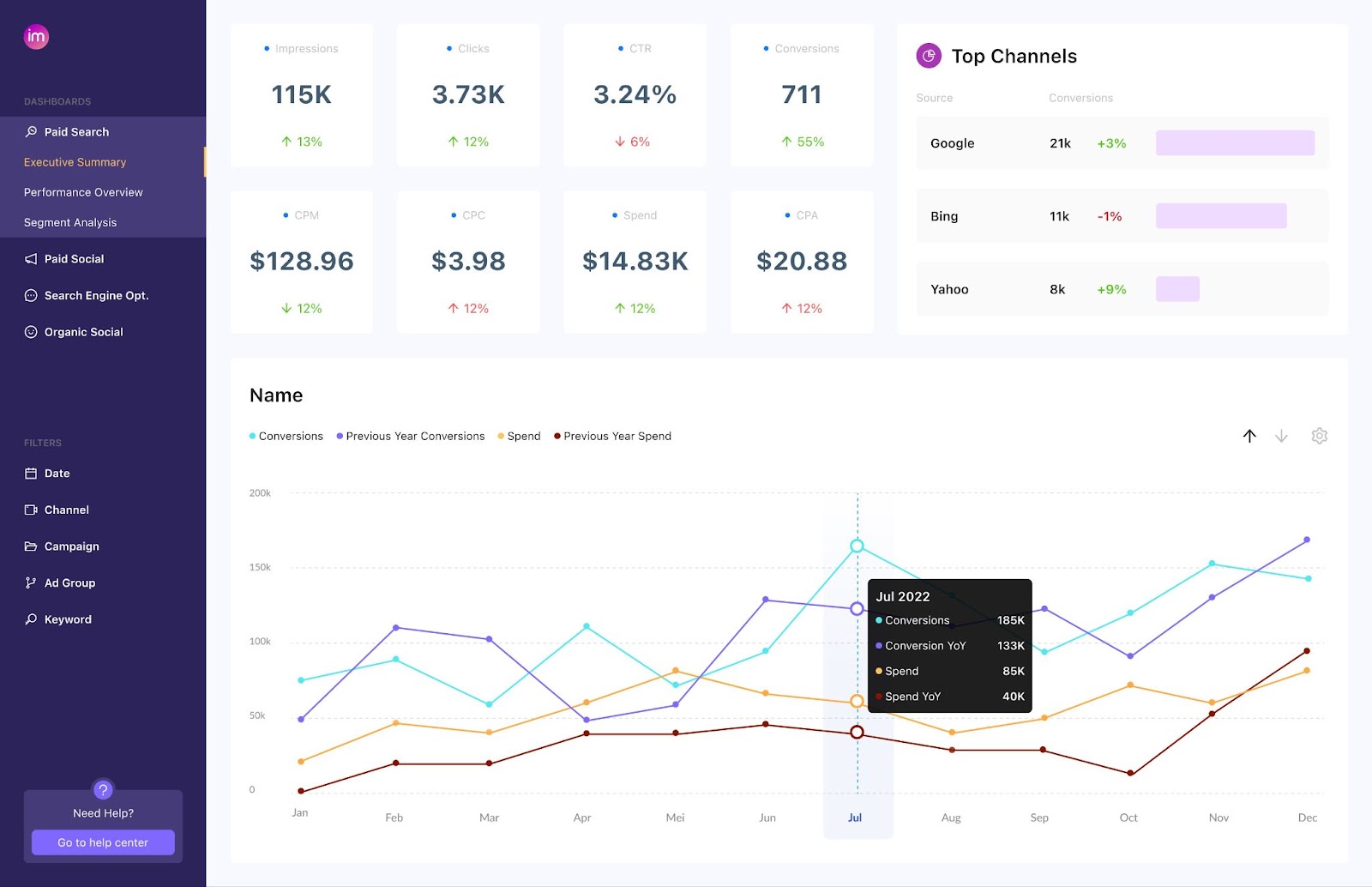
Improvado is an advanced marketing analytics and intelligence solution that automates the entire marketing reporting cycle:
- Data Integration: Improvado pulls data from 500+ marketing and sales platforms, online, offline, and custom data sources. It integrates easily with popular CMS platforms, eCommerce systems, and marketing tools, making it adaptable to diverse business environments.
- Data Preparation: It automatically harmonizes the data, including deduplication, cleansing, and mapping, to prepare data for visualization and analysis.
- Data Loading and Storage: The platform loads analysis-ready data to a storage or BI solution of your choice. Improvado seamlessly connects with enterprise-grade storage solutions and provides data warehouse management services.
- Data Visualization: Improvado provides pre-built dashboards, like marketing attribution and paid search, to begin processing and analyzing their data immediately.
- Real-Time Performance Tracking: Improvado provides a robust solution for campaign performance, brand safety, and data compliance tracking. It monitors adherence to pre-defined rules, paces metrics, and issues alerts for any anomalies, problems, or metrics drips.
How Does Improvado Handle HIPAA Compliance?
Improvado demonstrates GDPR compliance by implementing robust measures to protect personal data and ensure lawful processing:
- Technical and Organizational Safeguards: Improvado employs strong security measures, including encryption, access controls, and monitoring systems, to protect personal data against breaches, unauthorized access, and misuse.
- Authorized Sub-Processors: Improvado works only with trusted sub-processors who comply with strict data protection standards. Each sub-processor is carefully vetted and monitored to ensure GDPR adherence.
- Facilitation of Data Subject Rights: Improvado helps clients address data subject requests, such as access, correction, or deletion of personal data, ensuring compliance with GDPR requirements for user rights.
- Transparency in Data Processing: Improvado provides clear documentation on processing data, including the purpose, scope, and duration of processing activities, ensuring complete transparency with clients.
- Lawful Data Transfers: Improvado adheres to Standard Contractual Clauses (SCCs) for international data transfers to ensure data is protected and transferred lawfully in line with GDPR requirements.
- Data Minimization: The platform ensures that only necessary personal data is collected and processed, reducing the risk of overcollection or misuse of information.
- Breach Response Procedures: The company maintains a robust process for identifying, responding to, and mitigating data breaches, including notifying affected parties and regulatory authorities within required timeframes.
- Continuous Compliance Monitoring: Improvado regularly reviews and updates its data protection policies and practices to ensure ongoing alignment with GDPR.
These measures collectively ensure that Improvado handles data responsibly and in compliance with GDPR.
2. Matomo
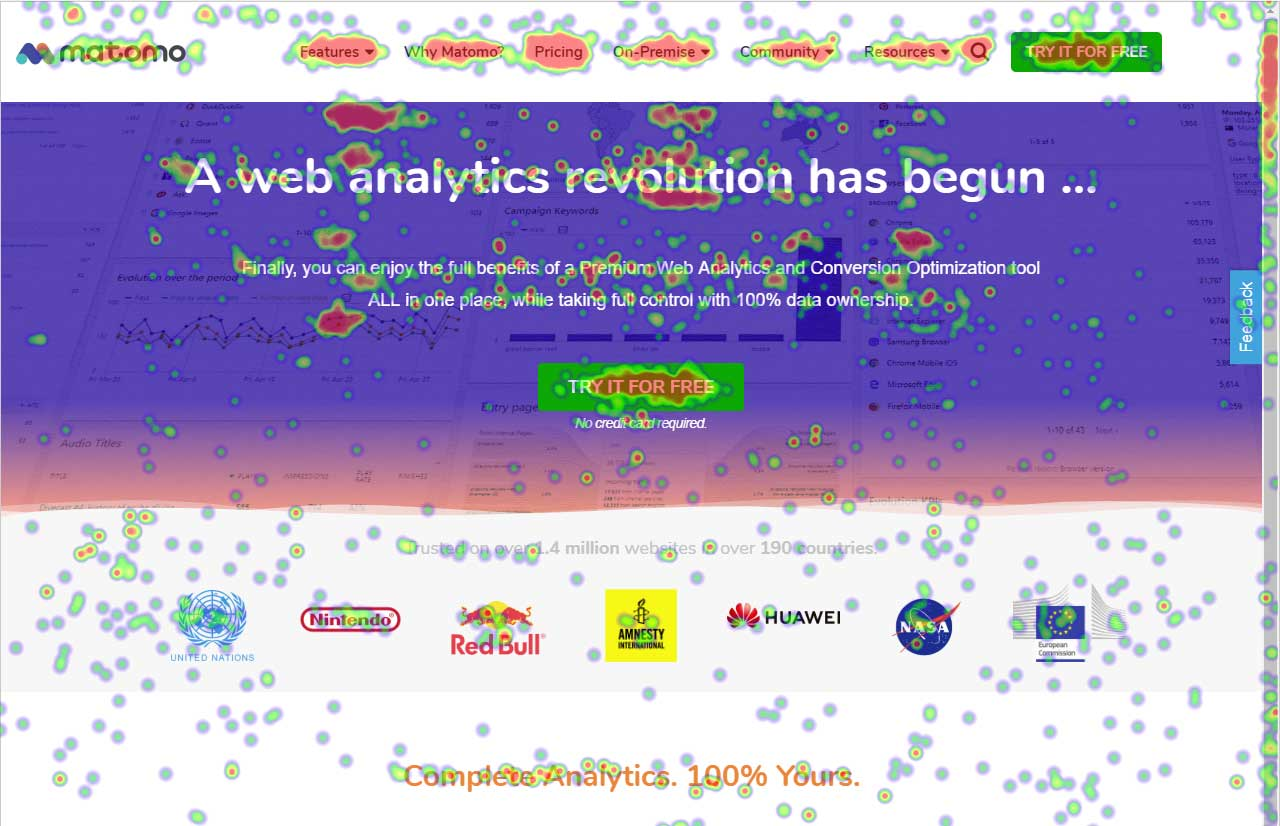
Matomo is an open-source analytics platform that emphasizes privacy and data control, making it particularly well-suited for businesses navigating GDPR requirements.
Key Features:
- Full Data Ownership: Provides flexibility to host analytics data on-premise (meaning a storage managed and maintained by your own IT team) or in a secure cloud environment, eliminating reliance on third-party servers and ensuring compliance with GDPR requirements.
- No Data Sampling: Offers accurate, unsampled data, enabling precise analysis of user behavior and trends across digital platforms.
- Built-In Privacy Features: Includes essential privacy safeguards like IP anonymization, user consent management, opt-out options, and tools for managing data access or deletion requests in line with GDPR mandates.
- Customizable Analytics: Matomo allows businesses to tailor reports and dashboards to meet both operational needs and specific regulatory compliance requirements.
3. PostHog
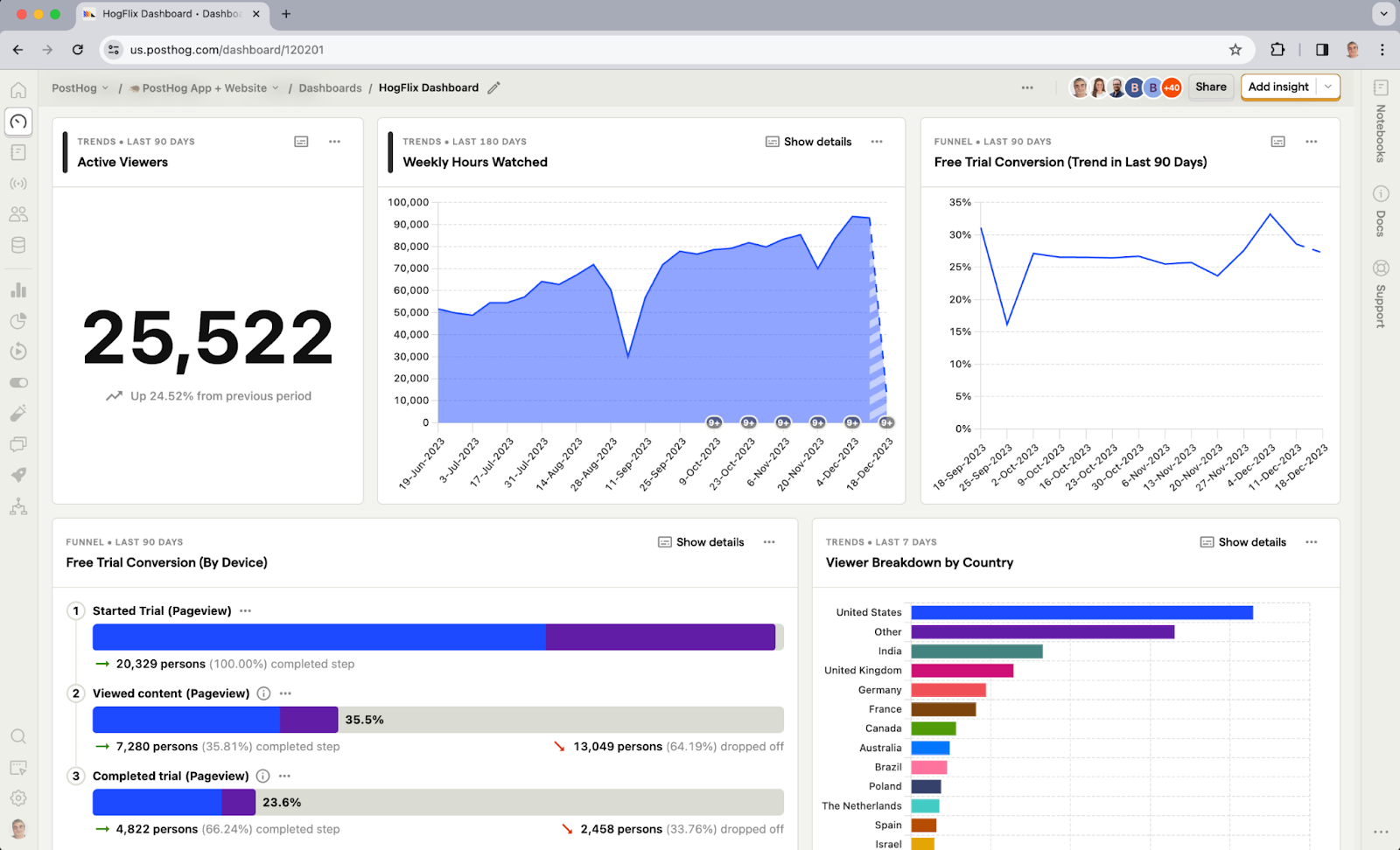
PostHog is one of the best self-hosted, open-source GDPR tools. It emphasizes self-hosting and keeping sensitive information within an organization’s infrastructure. PostHog is particularly suited for product-focused teams looking for flexible and privacy-conscious analytics.
Key Features:
- Self-Hosting for Full Data Control: By hosting PostHog on their own servers, businesses ensure complete compliance with GDPR regulations and eliminate concerns about third-party data access.
- Event-Based Tracking: Provides detailed insights into user actions and behaviors across websites and applications, helping to optimize product performance and customer engagement.
- Privacy-Friendly Features: Includes tools for IP anonymization, user consent management, and data deletion to comply with GDPR requirements.
- Custom Dashboards and Reports: Offers customizable dashboards that allow businesses to focus on metrics most relevant to their operations and compliance needs.
- Integration Flexibility: Supports integrations with various developer tools and platforms, making it suitable for a wide range of technical ecosystems.
4. Heap
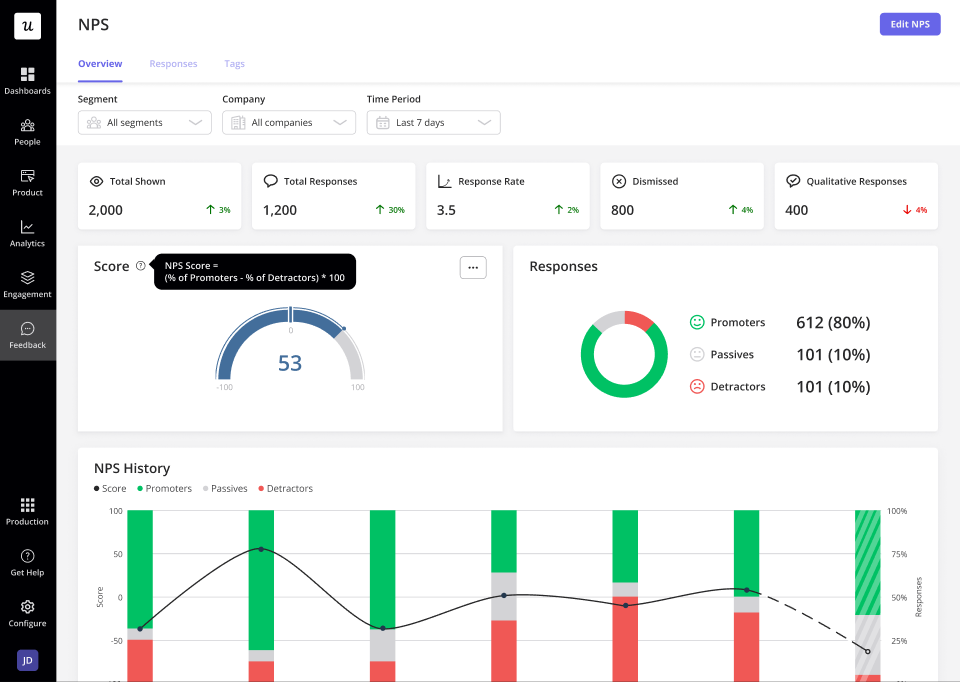
Heap is an advanced digital analytics platform designed to automatically capture and analyze user interactions across websites and applications.
Key Features:
- Automatic Data Capture: Heap tracks every user interaction, including clicks, form submissions, and page views, without requiring manual tagging, ensuring comprehensive data collection.
- Privacy-Focused Design: Includes features like IP anonymization, data filtering, and tools for managing user consent and data deletion to align with GDPR requirements.
- Event-Level Data Analysis: Enables in-depth exploration of customer journeys, providing granular insights into user behavior and conversion paths.
- Retrospective Analysis: Captures all interactions from the start, allowing teams to analyze previously untracked data without requiring reconfiguration.
- Customizable Dashboards: Allows businesses to create tailored reports and dashboards to monitor KPIs while maintaining compliance with data privacy laws.
- Seamless Integration: Integrates with a wide array of marketing and analytics tools, ensuring consistent data flow across platforms while respecting GDPR safeguards.
5. Fathom
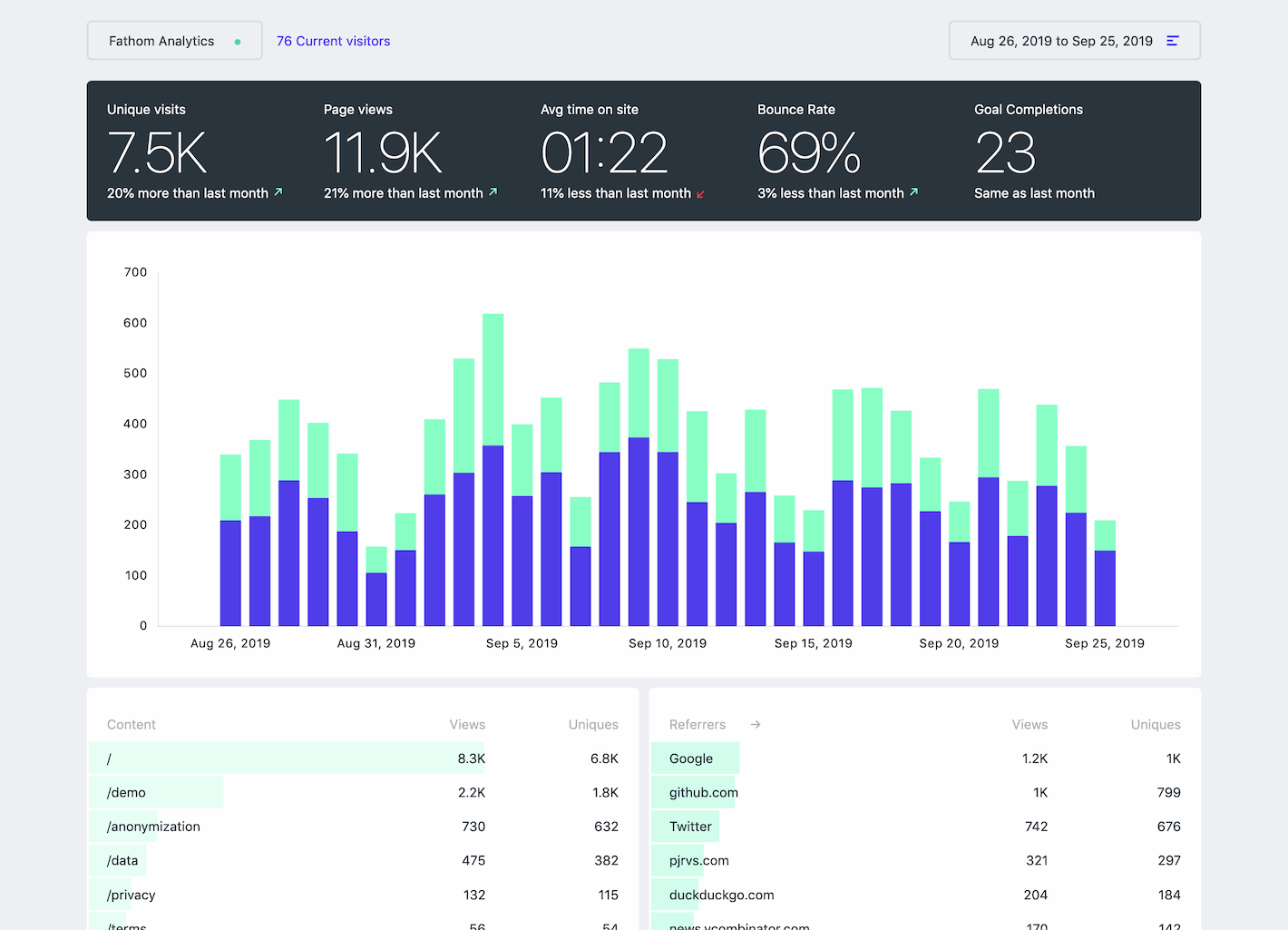
Fathom is a GDPR-compliant Google Analytics alternative. It’s a privacy-first website analytics platformfully adhering to GDPR and other data privacy regulations.
Key Features:
- Privacy by Default: Does not use cookies, eliminating the need for cookie consent banners and reducing the compliance burden for GDPR and similar regulations.
- Simplified Metrics: Focuses on providing essential metrics like traffic, referrers, and user behavior in a straightforward, easy-to-digest format.
- Server-Side Data Processing: Processes analytics on its servers without sharing data with third parties, ensuring full data ownership and privacy.
- Fast and Lightweight: Minimal impact on website performance due to its lightweight design, improving user experience and page speed.
- Automatic Data Anonymization: Ensures that no personally identifiable information (PII) is collected, keeping businesses compliant with GDPR standards.
- Customizable Reporting: Allows businesses to filter and segment data to focus on the metrics most relevant to their goals.
Build Your GDPR-Compliant Analytics Stack
Building a GDPR-compliant analytics stack is essential for businesses operating in regions with stringent data privacy laws.
All these tools are solid options for businesses seeking GDPR analytics solutions that combine privacy compliance with straightforward insights:
- Improvado: Best for enterprise-level marketing analytics, offering seamless data integration and advanced governance tools to unify and analyze data across multiple platforms. Get a demo to learn more about the platform and its analytics capabilities.
- Matomo: Best for organizations needing full data ownership and customizable analytics with a strong focus on privacy.
- PostHog: Best for product teams seeking self-hosted, event-based analytics with deep customization and privacy features.
- Heap: Best for businesses looking for automatic, comprehensive data capture and retroactive analysis without manual tagging.
- Fathom: Best for small to medium-sized businesses focused on simplified GDPR-compliant website analytics without the need for cookies.
Each of these tools addresses specific analytics needs while maintaining strict adherence to GDPR regulations, making them valuable components of a modern, privacy-first analytics strategy.
.png)



.png)
